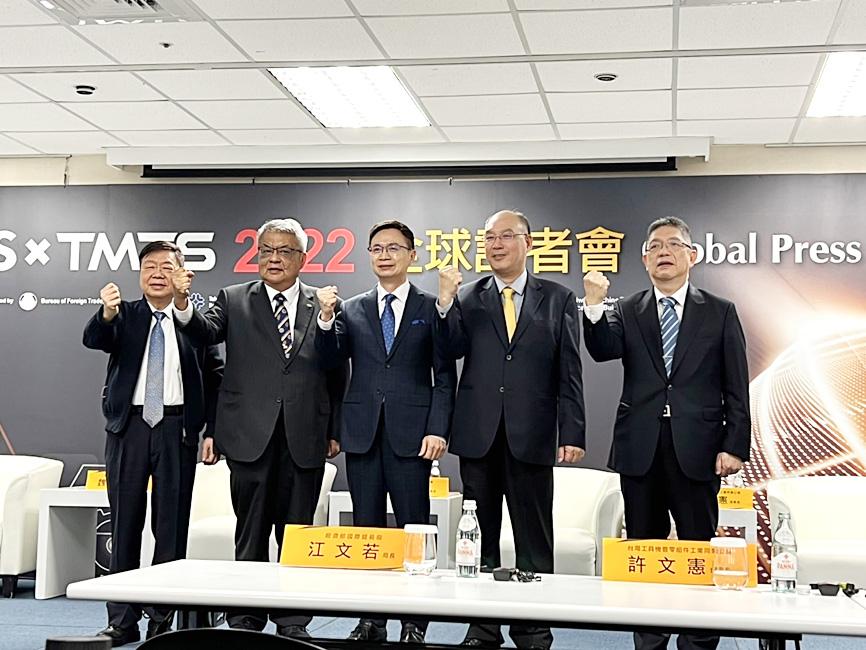The production value of the nation’s machine tool industry is forecast to grow by 20 percent to 30 percent on an annual basis next year, as local firms have better order visibility into the second quarter of next year, Taiwan Machine Tool and Accessory Builders’ Association (台灣工具機暨零組件公會) chairman Habor Hsu (許文憲) said yesterday.
With a noticeable uptick in demand from the US and Europe this quarter, a production value increase of up to 30 percent is achievable next year, Hsu said.
Increased demand from the two markets would make up for softness in Chinese demand, he said.

Photo: Lin Jin-hua, Taipei Times
However, high commodity prices are here to stay, Hsu said, anticipating that prices of raw materials would remain high for the next three years amid US-China trade tensions, the lingering COVID-19 pandemic and supply chain bottlenecks.
This year, the industry has faced challenges such as unfavorable exchange rates, logistics bottlenecks, and labor and component shortages, Hsu said.
From January through last month, machine tool exports totaled US$2.25 billion, up 27.6 percent year-on-year, data compiled by the Taichung-based association showed.
By product breakdown, exports of metal-cutting machines grew 27.4 percent year-on-year to US$1.86 billion, while metal forming machines rose 28.6 percent to US$381 million, association data showed.
Some positive developments are expected to boost the sector next year, such as a rebound in global demand, but unfavorable exchange rates would remain a main challenge for local producers, he said.
The government should keep a close eye on the exchange rates of the New Taiwan dollar to yen and won, as Japan and South Korea are Taiwan’s main competitors in the industry, he said.
The government should help stabilize the exchange rates with the two countries and China, Hsu said, adding that it should do so cautiously, as inept policies might lead to currency manipulation charges.

Taiwan Transport and Storage Corp (TTS, 台灣通運倉儲) yesterday unveiled its first electric tractor unit — manufactured by Volvo Trucks — in a ceremony in Taipei, and said the unit would soon be used to transport cement produced by Taiwan Cement Corp (TCC, 台灣水泥). Both TTS and TCC belong to TCC International Holdings Ltd (台泥國際集團). With the electric tractor unit, the Taipei-based cement firm would become the first in Taiwan to use electric vehicles to transport construction materials. TTS chairman Koo Kung-yi (辜公怡), Volvo Trucks vice president of sales and marketing Johan Selven, TCC president Roman Cheng (程耀輝) and Taikoo Motors Group

Among the rows of vibrators, rubber torsos and leather harnesses at a Chinese sex toys exhibition in Shanghai this weekend, the beginnings of an artificial intelligence (AI)-driven shift in the industry quietly pulsed. China manufactures about 70 percent of the world’s sex toys, most of it the “hardware” on display at the fair — whether that be technicolor tentacled dildos or hyper-realistic personalized silicone dolls. Yet smart toys have been rising in popularity for some time. Many major European and US brands already offer tech-enhanced products that can enable long-distance love, monitor well-being and even bring people one step closer to

RECORD-BREAKING: TSMC’s net profit last quarter beat market expectations by expanding 8.9% and it was the best first-quarter profit in the chipmaker’s history Taiwan Semiconductor Manufacturing Co (TSMC, 台積電), which counts Nvidia Corp as a key customer, yesterday said that artificial intelligence (AI) server chip revenue is set to more than double this year from last year amid rising demand. The chipmaker expects the growth momentum to continue in the next five years with an annual compound growth rate of 50 percent, TSMC chief executive officer C.C. Wei (魏哲家) told investors yesterday. By 2028, AI chips’ contribution to revenue would climb to about 20 percent from a percentage in the low teens, Wei said. “Almost all the AI innovators are working with TSMC to address the

Malaysia’s leader yesterday announced plans to build a massive semiconductor design park, aiming to boost the Southeast Asian nation’s role in the global chip industry. A prominent player in the semiconductor industry for decades, Malaysia accounts for an estimated 13 percent of global back-end manufacturing, according to German tech giant Bosch. Now it wants to go beyond production and emerge as a chip design powerhouse too, Malaysian Prime Minister Anwar Ibrahim said. “I am pleased to announce the largest IC (integrated circuit) Design Park in Southeast Asia, that will house world-class anchor tenants and collaborate with global companies such as Arm [Holdings PLC],”